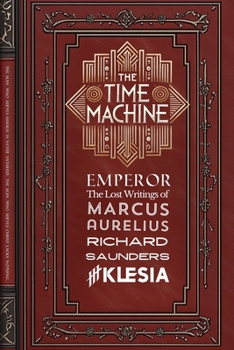The Time Machine: Emperor: The Lost Writings of Marcus Aurelius
The Time Machine: Emperor - The Lost Writings of Marcus Aurelius
"What if the last words of Rome's greatest emperor had never been recorded-until now?"
Marcus Aurelius, the philosopher-king, the last great emperor of Rome, left behind his Meditations-a masterpiece of Stoic wisdom that has guided thinkers, warriors, and rulers for centuries. He was a man of reason, discipline, and virtue. But what if his journey had not ended with Stoicism?
What if, in the final years of his life, he encountered something greater?
This book presents Emperor: The Lost Writings of Marcus Aurelius, a manuscript that defies historical explanation. Delivered in the same mysterious manner as the previous recovered texts, Emperor is a work of philosophy transformed by revelation-a testimony of a man who gazed beyond the limits of the Stoic mind and saw the Logos made flesh.
In this astonishing document, Marcus Aurelius does not reject his earlier wisdom, but fulfills it. What begins as a reflection on suffering, discipline, and the nature of impermanence soon deepens into a search for eternal truth. The emperor who once ruled the world lays down his crown before the true King.
A Manuscript That Should Not ExistFollowing the structure of his original Meditations, Emperor explores:
✔ The Illusion of the Self - A profound discussion on the impermanence of the ego and the necessity of dying to oneself.
✔ The Logos Made Flesh - The moment when Marcus Aurelius encounters not merely an impersonal divine reason, but the personal Christ.
✔ The Philosopher-King and the Eternal King - A powerful comparison between Rome's earthly rulers and the Messiah who reigns forever.
✔ On Suffering and Strength - How suffering, once endured with Stoic indifference, is now embraced as a path to transformation through Christ.
✔ The Kingdom That Does Not Fall - A final meditation on Rome's decline and the unshakable Kingdom of God.
The origins of this manuscript remain a mystery. The text, structure, and language align perfectly with the Meditations-yet its message is unlike anything seen before in Marcus Aurelius' writings.
Could this be a genuine lost work, hidden for centuries?
Or is its arrival evidence of something even more extraordinary?
For those who revere Marcus Aurelius as a philosopher, this book will challenge everything you thought you knew.
For those who seek wisdom that does not fade, it may offer something far greater.
"What is the greatest discipline? To lay down one's own will before the One who is greater. What is the highest wisdom? To bow before the Truth Himself." - From Emperor"
Read now and judge for yourself: Is this the final revelation of the Philosopher-Emperor?
Related Subjects
Philosophy




